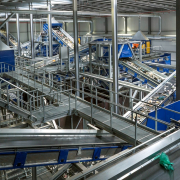AMCS Platform: Cloud Computing Has Made Working Lives Easier
The Cloud has helped many recycling and waste management businesses ride out the Covid storm by enabling remote working during the pandemic. These companies could continue to provide their services to municipal and commercial customers because customer service representatives, planners, and other office members were able to work from home.
Without the cloud and the advanced digitalization of business processes, it would have been extremely difficult, if not impossible, for many recycling and waste management companies to keep their operation going especially if office working was not possible due to lockdown measures.
Many waste and recycling companies have learned that digitalization is no longer an advantage, but a necessity for the business to be able to service customers in every condition.
Clearly, cloud services like the AMCS Platform, have made digitalization much more reliable. It can guarantee 99.9% up-time, protect you from power outages, fires, flooding, or any other risk that could bring businesses to a grinding halt and disappoint customers with poor service.
The cloud helps users scale automatically to help them deal with peak hours so the customers will always have a great experience when using a company’s services. It also brings extra security protection against cyber-attacks like ransomware and viruses.
However, it might come as a surprise that cloud computing technologies are much more sustainable too. That means vast differences in energy use and carbon emissions when compared to local, dedicated servers. The Lawrence Berkeley National Laboratory projects that if every US company moved email, ERP solutions, and other business software to the cloud, it would save enough electricity to power Los Angeles for a year – this is because the energy consumption of these software applications is reduced by 87% by being deployed in the cloud.
Lower CO2 emissions
Cloud providers like Microsoft are offering tools to track and reduce an organization’s carbon emissions – the cloud can help you track and report on a company’s sustainability goals too.
Fighting climate change requires innovation, but digitalization also brings improved margins and better customer service.
It is a misconception that taking sustainability measures, will have a negative impact on operating margins. It is actually an opportunity that can give businesses a competitive advantage.
This is because of benefits such as savings on energy use, especially at a time of soaring costs. But additionally, sustainability measures will contribute to the customer’s sustainability goals too, making the user a preferred business to work with especially those that have ESG reporting requirements.
Cloud computing is more sustainable because:
- It saves energy – essential in a time of soaring energy prices
- Cloud providers, like Microsoft, can use economies of scale to make enormous energy and carbon savings, reduce water use and cut waste
- Reduces use of paper
- Creates less waste electrical and electronic equipment (WEEE)
- New technologies can use the cloud on environmentally beneficial projects.
Why is the cloud energy efficient?
Whether a company’s recycling and waste management business are a multi-national or a small family operation, the users might still have their own data storage servers dedicated to them. In an industry where small margins can make a difference, those recycling and waste firms that have invested in cloud computing are better able to control their energy costs, or even make savings despite rising electricity costs. Shared data centers optimize resources so that server usage is more efficient. Dedicated servers in a business can be under-utilized using energy to keep running, but storing little data. Cloud data centers are also likely to upgrade their equipment more regularly to new and more energy-efficient technology, which benefits all of their customers.
When combined with making employees more collaborative and productive, it makes even more sense to switch from on-premise servers to the cloud. With the cloud-based AMCS Platform, energy efficiency is built into provision with local energy-hungry servers no longer necessary.
The large economies of scale seen in cloud computing mean that commercial cloud services, in general, can operate with much greater IT operational efficiency than smaller, on-premises deployments.
These are the technologies that are driving energy efficiencies in Data Centers:
- Dynamic provisioning – Emphasis on application availability can lead to overprovisioning of computing resources to avoid theoretical unmet demand. Improved matching of server capacity with actual demand minimizes waste. Cloud providers manage the capacity efficiently to avoid expensive overprovisioning, through monitoring and demand prediction that allow for continual capacity adjustment.
- Multitenancy – Cloud providers use multitenancy, occupying servers with multiple user types and a large user base with different demand patterns. Just as the electric grid interconnects thousands of users whose fluctuating power demands can balance one another, cloud infrastructure hosts thousands of companies and millions of users whose different use patterns can balance one another.
This leads to improved Server utilization – this means the same amount of work can be done with fewer servers, which in turn leads to less electricity consumed per useful output. While servers running at higher utilization rates consume more electricity, the overall performance gains more than offset the relative per-unit increase.
Source: AMCS Group (Limerick, Ireland, November 19, 2021)









